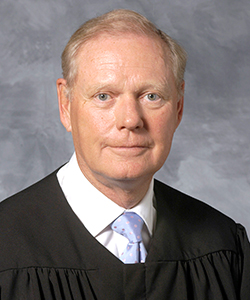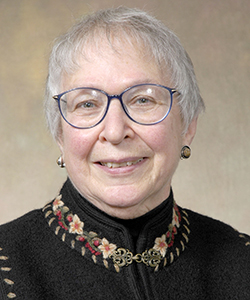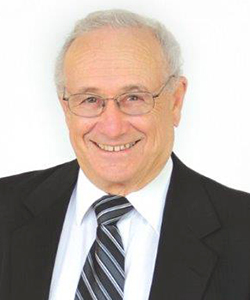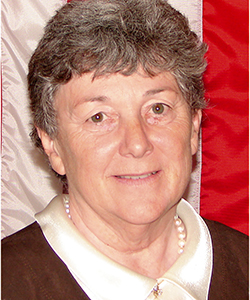May 21, 2014 – “It’s a long time and it went in a snap,” said Wisconsin Supreme Court Justice Shirley Abrahamson at a recent event honoring State Bar of Wisconsin members who celebrate 50 years in the profession this year.
These are the lawyers and judges who were admitted to their first bar in 1964. And although the time may have passed “in a snap," there was certainly time for them to make major contributions in the legal community.
In this article, the State Bar highlights a handful of State Bar members who used their time to serve people, business, and organizations in different and notable ways, whether as advocates, judges, legislators, or volunteers.
These members include Judge Thomas Cane, U.W. Law Professor June Weisberger, attorney Howard Goldberg, former Governor Martin Schreiber, and attorney Maryann Schacht. This is just a sampling.
To document the contributions and achievements of every lawyer on the 50-year member list may very well take 50 years, given the outstanding body of work. We also note that many contributions go unnoticed. Such is the nature of the legal profession.
Instead, we highlight some, and celebrate all. Again, congratulations to all the 50-year members for your outstanding service. The State Bar of Wisconsin thanks you.
View the full list of 50-year members at the end of this article, and visit the State Bar Facebook page to view a photo album of the recent 50-year Member Celebration.
Hon. Thomas Cane: Career Judge Who Almost Wasn’t
Judge Thomas Cane spent 35 years on the bench in Wisconsin, including 26 years as judge for the Wisconsin Court of Appeals. But one fateful decision could have changed all this. Judge Cane, after all, was planning to be a pilot in the U.S. Air Force.

“I was young, a little naive. I really thought I could be both a lawyer and a pilot when I finished. I was wrong,” says Judge Thomas Cane, who spent 35 years on the bench in Wisconsin.
A member of the Air Force ROTC as an undergraduate at the University of Michigan, Cane was about to graduate in 1961. He asked his commander when he would be dispatched for pilot school, and Cane learned he’d have to wait almost a year.
“I didn’t want to sit around that long, so I rushed and took the law school entrance exam. I was at Marquette Law School that fall,” Judge Cane said. “I was young, a little naive. I really thought I could be both a lawyer and a pilot when I finished. I was wrong.”
Judge Cane deferred pilot school to finish law school, and when he graduated in 1964, the Air Force said he had two choices: Judge Advocate General Corps (JAG), with captain status in six months; or pilot school as a Second Lieutenant. He chose JAG.
“Sometimes I regret not going to pilot school, but I spent a long and satisfying career on the bench,” said Judge Cane. “Ultimately, I think I always wanted to be a judge too.”
As a member of Air Force JAG, Cane spent three years stationed in Okinawa. He prosecuted and defended air force members accused of crimes, trying an average of one case per week. He also served as officer in charge of plane crash investigations.
About once per month, he would travel to Thailand or Vietnam, where the Vietnam War was raging, to provide legal services to air force personnel stationed there.
Upon his discharge and return from Okinawa, where his two daughters were born, he reentered American life amidst conflict on war, poverty, and discrimination.
“That was in 1967 when all the riots were happening in Milwaukee,” Judge Cane said. “I didn’t understand what was going on in the United States during that time. A lot of people were upset with the war. We didn’t get that message when we were overseas.”
Cane worked in private practice in Kaukauna for about three years before serving two years as assistant district attorney for Outagamie County. In 1972, now in his early 30s, he was appointed to the circuit court bench, where he stayed for the next nine years.
As judge, Cane presided in nearly 45 jury trials per year, at least in his last three years, which is extremely high by today’s standards. Among his most interesting cases, Judge Cane recalls the 1976 case against Virginia Schwerbell, who was eventually convicted for trying to kill her husband by poisoning his food with arsenic in Appleton. Through a hair sample, police learned that the poisoning continued while he lay ill in the hospital.
By the time Judge Cane was appointed to the appeals court bench in 1981, he was ready for the change but admits that he missed the daily grind of the trial court.
“As a trial judge, you have a calendar that just runs your life,” Judge Cane said. “You are constantly going from one case to another. You are dealing with motions, lawyers, witnesses, plaintiffs and defendants, and a huge court staff all at once.”
“You’ve got calls from the police asking for search warrants. You are very, very active,” he said. “All of sudden, you go on the court of appeals and you think the world stopped.”
But Judge Cane settled in, and spent the remainder of his full-time career on the appeals court bench until his retirement in 2007. For his last nine years, Judge Cane served as chief judge, after nine years in his capacity as deputy chief judge.
Asked about the biggest change in the legal profession during his time, Judge Cane cited the decline of civility among lawyers, both inside and outside the courtroom.
“As time progressed, instead of talking to each other, lawyers would file motions and ask the court to make decisions on things they used to work out among themselves,” Judge Cane said. “I’m not sure if lawyers are just protecting themselves from malpractice claims, like doctors, but civility is certainly not what it used to be.”
After his retirement in 2007, Judge Cane served on the Wisconsin Government Accountability Board for six years, and now continues to serve a reserve judge at both the court of appeals and circuit court levels, which is rare. “My wife made a sign for me. It says: ‘What part of ‘retirement’ don’t you understand,’” Judge Cane joked.
Prof. June Weisberger: Labor Law and Beyond
Attorney and law professor June Weisberger spent most of her career teaching labor and employment law at the University of Wisconsin Law School. But the Chicago native was never shy when it came to new undertakings, however big or small.

“I thought it was important for students to see what [law] was really like … to see the real thing involving real people and real problems. As somebody who went to law school not knowing what lawyers really did, I thought it was very important to give students exposure to this experience,” says Attorney and law professor June Weisberger.
Weisberger was instrumental the in process that led to passage of Wisconsin’s Marital Property Act in 1984. It started out simple enough: Advise students who were working on Wisconsin’s Commission on the Status of Women, first established by former Gov. John Reynolds in 1964 to study issues and policies affecting women in the state.
In this capacity, Weisberger and others began exploring the policies that affect marital property division at divorce, and changes were needed. “I got very heavily involved first in divorce law reform and then in the Marital Property Act,” Weisberger said.
“That was not something I had obviously planned because my major field for being here was labor relations, but I was also teaching trusts and estates. I became very active in the legislative process, which finally ended with legislation that was passed in 1984.”
Weisberger was never hesitant to explore opportunities. As a young mother and wife in the 1950s, Weisberger decided to attend law school at the University of Chicago.
One of just three women in her class, Weisberger was among the women pioneers who braved the male-dominated profession to lead the way for future women lawyers. She juggled three full-time years in law school with the trials and tribulations of parenting.
She thought a law degree would allow her to obtain a good part-time job. Little did she know her full-time knowledge and ability would be demanded the next 35 years.
Upon graduation, her family moved to Rochester, New York, where she obtained a full-time job as an assistant city attorney in 1964 after passing the New York Bar Exam.
“I represented the zoning board, the fire department, I drafted legislation for the city council, and I did some work for the school board,” Weisberger said. “I did a lot of different things. I loved it. It was very much the general practice of law.”
“And then I was asked by the school board whether I would be interested in becoming their legal counsel full-time,” said Weisberger. “At that time, the school teachers wanted to unionize and be recognized and so did the nonteaching employees. So I spent the majority of my time on labor related issues with the school employees.”
In 1972, after six years, Weisberger became visiting associate professor at Cornell University’s School of Industrial and Labor Relations. In 1974, she joined U.W. Law School, where she stayed until her full retirement from teaching in 1998.
“Wisconsin historically was the leader in public sector labor relations for a long time. And I thought it was a particularly interesting state to be teaching that subject because so many creative things were happening as far as the statutory structure for collective bargaining for public employees,” said Weisberger, who notes the climate has changed.
During her time at U.W. Law School, she embraced the “law in action” approach, taking her students to watch live labor and employment mediations and arbitrations that she took by appointment from the Wisconsin Employment Relations Commission.
“I thought it was important for students to see what it was really like,” she said. “We did mock arbitrations, but this was the opportunity to see the real thing involving real people and real problems. As somebody who went to law school not knowing what lawyers really did, I thought it was very important to give students exposure to this experience.”
Atty. Howard Goldberg: The Right Career Choice
In 1961, Howard Goldberg walked over to U.W. Law School and asked Dean George Young about auditing some law school classes. He wanted to enhance his work as a life insurance salesman. According to Goldberg, Dean Young said: “You should just enroll.”

“There used to be more collegiality among the lawyers … While you might be butting heads with them in court one day, as soon as the whistle blew, you’d go out and socialize together. It just doesn’t happen now,” says Howard Goldberg, former executive director of the Dane County Bar Association.
“I was pretty young, so I agreed,” Goldberg said. That was the end of Goldberg’s life insurance career, led astray by Dean Young’s four magic words.
“What they didn’t tell me was that when you get a law degree, you can’t practice law and also sell life insurance. It was a conflict. I didn’t realize that when I started,” he said.
Goldberg graduated in 1964 and earned a clerkship for Wisconsin Supreme Court Justice Myron Gordon (1962-67), deferring his offer to join what is now Murphy Desmond S.C. in Madison. It was the first of many strategic moves Goldberg would make in a law career that came full circle in 2003, when he rejoined his first firm.
The clerkship, he said, was spectacular. “You get immersed in so many different areas of the law in a hurry. It was the best way to prepare me for real law practice.”
After his one-year clerkship, Goldberg practiced for 10 years at Murphy Desmond before leaving the firm to start a solo practice. Soon, he hired an associate named Bryan Woods, and the firm later became known as Goldberg & Woods.
“We got along in general practice for another 10 years or so,” Goldberg said. “But times were changing. It became increasingly difficult to be general solo practitioners.”
The firm disbanded. Goldberg joined what is now Dewitt Ross & Stevens S.C., before moving to the Janesville firm of Brennan & Steil S.C., as it’s now called.
During this time, Goldberg focused on estate and tax planning, but also represented cities and counties in employment matters until recently, when the law changed. He took part in many mediations, arbitrations, and labor negotiations over the years.
Goldberg achieved success with his lawyering skills. But he says a strong understanding of accounting principles was also instrumental. For those young lawyers looking to learn some new strategies for success, he says: “learn the game of poker.”
Now he lives the majority of the year in Florida and maintains a reduced caseload at his current firm, Murphy Desmond S.C., where he started his career. He rejoined them in 2003 along with Woods. Goldberg recalls the great camaraderie of the old days.
“There used to be more collegiality among the lawyers,” Goldberg said. “You knew everybody. While you might be butting heads with them in court one day, as soon as the whistle blew, you’d go out and socialize together. It just doesn’t happen now.”
Goldberg served two successive terms of the on the State Bar’s Board of Governors in the 1990s and was active on many different State Bar committees. He was also the executive director of the Dane County Bar Association for seven years.
Former Governor Martin Schreiber: Not a Lawyer-Lawyer
Every year, hundreds of law students graduate from Wisconsin’s two law schools. Some become practicing lawyers. Some don’t. For Martin Schreiber, former governor of Wisconsin (1977-79), a law degree allowed him to stick with his convictions.
<iframe src="//www.youtube.com/embed/0XfMFBVBTe0?rel=0&autohide=1" width="325" height="250" frameborder="0" allowfullscreen></iframe>
In this video, courtesy of the Wisconsin Legislative Reference Bureau’s Oral History Project, former Wisconsin Gov. Martin Schreiber discusses his law school experience, with some characteristic humor. View the entire interview, http://legis.wisconsin.gov/lrb/oral_history/index.htm.
“It was never my intent to be a lawyer-lawyer, but it was always my intent to want to serve in public life,” Schreiber said. “I did not want to be in a position where my decision-making as a political figure was based on saving my job in office.”
Schreiber attended Marquette University Law School. He was in law school in 1962 when he ran for the Wisconsin Senate and won at the age of 23. He represented portions of the city of Milwaukee, where his father served in politics for 34 years.
When he graduated from law school, he started a solo practice. He soon realized the commitment of solo practice would impede his ability to focus on politics, so he worked in smaller firms around Milwaukee, doing general practice legal work.
But his political career was advancing. In 1970, after eight years in the Senate, Schreiber was twice elected to the post of Lieut. Governor under the late Patrick Lucey. While in office, Schreiber spearheaded efforts to reform the nursing home industry.
“I read an article in Time or Newsweek, which outlined the major profits that nursing homes were receiving while providing inadequate services,” Schreiber said. “I introduced a bill at the end of the session, which would require nursing homes that accepted public pay patients to disclose their financial statements. A firestorm ensued.”
The nursing homes fiercely opposed, which led Schreiber, with support from Gov. Lucey, to call for investigations into nursing home practices. The investigations revealed egregious wrongs within the nursing home system. The Milwaukee Journal also began uncovering abuses. In the next session, major regulatory reforms were put in place.
In addition to tougher laws, Wisconsin explored alternatives to nursing home care and established an ombudsman program for complaints, all under Schreiber’s watchful eye.
In 1977, Lucey stepped down when appointed the U.S. Ambassador to Mexico by President Jimmy Carter, and Schreiber served as governor for the next two years.
In 1979, Schreiber lost the gubernatorial race to Lee Dreyfus, who had promised to return a $1 billion budget surplus to the people of Wisconsin. Schreiber wanted to invest the money and start a rainy day fund. He stuck to his convictions, and he lost.
“The people of Wisconsin spoke,” he said. “But you cannot take anything away from Lee Dreyfus,” Schreiber said. “He was an affable man and a golden tongue orator.”
Schreiber had reached the end of his political life. He moved into the private sector, first with Sentry Insurance, then as publisher of a financial management journal for ranchers and farmers, a position that allowed him to travel the state and the country.
He then served as president of a health insurance company in Milwaukee before lacing up his political shoes one last time: he ran but lost a close race to John Norquist in the 1988 election for Milwaukee mayor. But his experience made his next move clear.
He started a public affairs and government relations consulting business. His first client was Miller Brewing Company, helping them navigate issues in the brewing industry.
Martin Schreiber & Associates Inc. continues to represent a wide range of corporations, associations, labor unions, nonprofits, and other entities and persons in need.
Atty. Maryann Schacht: Dedicated, Small Town Lawyer
As Beaver Dam attorney Maryann Schacht tells the story, she was the first woman to be nominated to run for president of the State Bar of Wisconsin, but she didn’t have the support she needed to win. Even her closest allies campaigned against her in 1987.

“There’s a great deal of satisfaction in being able to serve the people and the community in this role,” says Beaver Dam attorney Maryann Schacht.
“My own husband didn’t want me to win, because it would take away from all the work that we had going on here,” said Schacht, who practices law with her husband, Herman Schacht, at the law firm of Schacht & Schacht. They’ll be married 50 years this June.
Although the presidency escaped her (she lost to Madison lawyer John Walsh), Schacht found numerous ways make herself known in Wisconsin’s legal community.
In 1975, former Wisconsin Gov. Patrick Lucey appointed Schacht to a three-year term on the Wisconsin Law Enforcement Standards Board. From 1992 to 1994, Schacht was president of the Wisconsin Law Foundation, the State Bar’s charitable giving arm.
Currently, she’s on the State Bar’s Challenges Facing New Lawyers Committee, which is exploring ways to help new lawyers who are facing economic and other challenges. Schacht was involved in numerous activities, and that’s just in her spare time.
Schacht has been practicing law for 50 years in Beaver Dam. She started out taking public defender appointments in the 1960s. A general practice lawyer for many years, Schacht now spends many hours as contract guardian ad litem for Dodge County.
She is still practicing law full-time, and she has also served as Beaver Dam’s city attorney for the last decade. Her husband was the city attorney for 40 years.
“Many lawyers can retire with a hobby to enjoy in their retirement,” Schacht said. “I never developed a hobby other than the practice of law. I loved what I was doing. My hobby and my love is the law, and I’ll keep sitting in this office chair as long as I can.”
For Schacht, love of the law started at a very early age. She remembers the joy of debate as early as grade school in Milwaukee. She was also driven to break the gender barrier. She was never intimidated in the face of a male-dominated profession.
And she was in good company when she entered U.W. Law School in the early 1960s. Among the three other women in her entering class: Barbara Crabb and Shirley Abrahamson, who was obtaining her doctorate in American legal history at the time.
Crabb went on to become U.S. District Judge for the Western District of Wisconsin. Shirley Abrahamson, of course, became chief justice for the Wisconsin Supreme Court.
Although she once aspired to practice international law, Schacht has no regrets as with her 50 years of small-town practice in Beaver Dam. “There’s a great deal of satisfaction in being able to serve the people and the community in this role,” she said.
Full LIst of 50-year Members in 2014
Conrado M. Almario, Elkhorn
Philip L. Atinsky, Milwaukee
Peter S. Balistreri, Milwaukee
Joseph N. Bauer, Oshkosh
Richard Gordon Baumann, Encino, Calif.
John H. Betz, Washington, D.C.
Robert H. Bichler, Racine
Gerald J. Bloch, Milwaukee
Gunar John Blumberg, Chicago
Duane C. Bojack, Wayzata, Minn.
Hon. Michael W. Brennan, Marshfield
Philip Lane Bruner, Stillwater, Minn.
Jules T. Brunner, Chicago
Earl G. Buehler, Madison
Paul J. Burbach, Brookfield
James P. Burns, Greendale
Robert J. Cameron, Dallas
Hon. R Thomas Cane, Wausau
Roch Carter, Thiensville
Jack P. Cerone, Des Plaines, Ill.
Frederick C. Christians, Grosse Pointe, Mich.
Thomas H. Combs, Fort Lauderdale, Fla.
John L. Conlon, Spring Green
Hon. Dennis D. Conway, Wisconsin Rapids
Gerald M. Crawford, Racine
Donald W. Dean, Two Rivers
Peter Dennis, Frankfort, Ill.
William Herbert Dieterich, Brookfield
Peter R. Dohr, Madison
Robert K. Drummond
Thomas C. Eckerle, Madison
David C. Eichinger, Tustin, Calif.
Charles W. Elliott, Madison
R Richard Erickson, Paradise Valley, Ariz.
David Bergfeld Falstad, Oconomowoc
Howard Joel Feldman, Washington, D.C.
Daniel D. Fetterley, Milwaukee
John D. Finerty, Milwaukee
Arthur H. Fink Jr., Milwaukee
Hon. Michael S. Fisher, Chapel Hill, N.C.
John D. Foley, Brookfield
Harold R. Fotsch, Mendota Heights, Minn.
James E. Fretty, Bayside
Jerry H. Friedland, Tucson, Ariz.
Duane L. Furan, La Crosse
John W. Galanis, Milwaukee
Howard Goldberg, Madison
Larry G. Gutz, Cedar Rapids, Iowa
Russell L. Hanson, Westby
William Haynes, San Francisco
Joyce Feldstein Hecht, Grand Rapids, Mich.
Jerome F. Holoubek, Bronx, N.Y.
James D. Jeffries, Loganville
Irving B. Kahn, Mequon
Sidney Kaplan, Minneapolis
W Phil Karrmann, Platteville
Jerome F. Kelly, Muskego
James R. Klauser, Pewaukee
Thomas N. Klug, Mequon
Gerald L. Koenig, Sussex
William N. Koslo, Redington Shores, Fla.
Michael B. Laikin, Henderson, Nev.
Lawrence J. Landwehr, Middleton
James F. Larson, Appleton
Robert J. Lerner, Milwaukee
|
Peter J. Lettenberger, Waukesha
William Ted Lewis, Springfield, Ill.
Larry E. Lichte, Madison
Bradway A. Liddle Jr., Madison
Mark G. Lipscomb Jr., Glendale
Richard L. Luedtke, San Jose, Calif.
David J. MacDougall, Delavan
Edward D. Main, Madison
Jeffrey E. Mandel, Millburn, N.J.
John L. McCausland, Barrington, Ill.
William Hazen McEssy, Lake Forest, Ill.
Eugene Meigher, Washington, D.C.
Francis Mettrick, New York
Anthony E. Migas, Battle Ground, Wash.
Robert A. Miller, Milwaukee
Frederic Mohs Jr., Madison
Joel Murray, Chicago
Frederick A. Muth Jr., Milwaukee
Carl B. Noelke Jr., San Francisco
Robert A Nordby Jr., Mercer Island, Wash.
James F. Parks, Elm Grove
Hon. Robert R. Pekowsky, Madison
Edward A. Pereles, Philadelphia
Michael J. Pfau, Milwaukee
Larry A. Pulkrabek, Lancaster, Pa.
Matthew H. Quinn, Estes Park, Colo.
S Louis Rathje, Wheaton, Ill.
Raymond Jon Rausch, Milwaukee
William P. Reilly, Fort Myers, Fla.
Fred A. Reiter III, Minneapolis
Robert D. Repasky, Fulton, Texas
J Frederic Ruf, Pewaukee
James P. Samster, Wausaukee
Maryann Scheftell Schacht, Beaver Dam
Sherin Schapiro, Milwaukee
John U. Schmid Jr., Palm City, Fla.
Alice M. Schmidt, Cape Neddick, Maine
Frederick R. Schneider, Cincinnati
Martin J. Schreiber, Milwaukee
Stephen F. Schreiter, South Milwaukee
Paul E. Schwemer, Delafield
Alan N. Shovers, Evansville, Ind.
Paul E. Sicula, Milwaukee
George G. Simons, Orlando, Fla.
Thomas A. Siratovich, Denver
James E. Smith, San Luis Obispo, Calif.
Hon. Harry G. Snyder, Oconomowoc
Thomas J. Sobota, Madison
Robert L. Starz, Greenfield
Richard C. Steinmetz, Milwaukee
John W. Stevens, Grafton
Roy G. Stohlman, Appleton
David A. Suemnick, Green Bay
Thomas Edward Terry, Madison
John David Thiel, Merrill
Hon. Raymond F. Thums, Wausau
Stuart G. Urban, Lancaster
Hon. Lawrence F. Waddick, West Bend
Michael L. Wagner, Fond Du Lac
Karen M. Wagner, Fond du Lac
June M. Weisberger, Madison
Hon. S Michael Wilk, Kenosha
John M. Williamson, Green Bay
Lee G. Wolcott, Milwaukee
James B. Young, Milwaukee |
